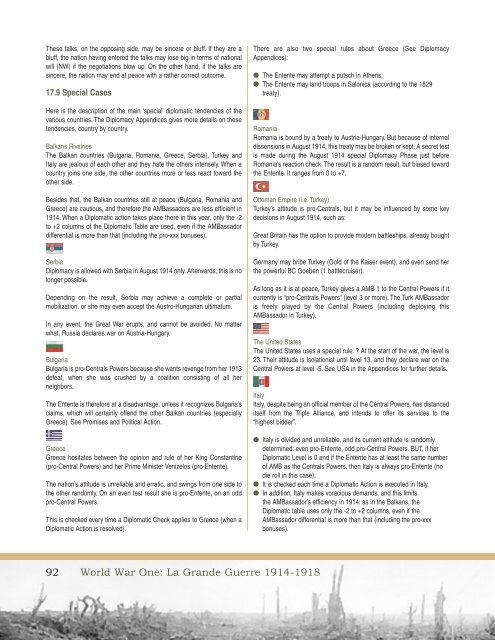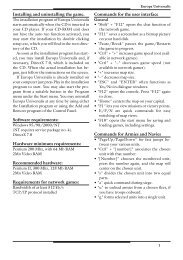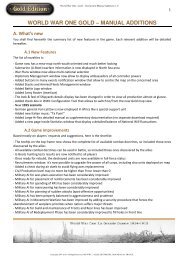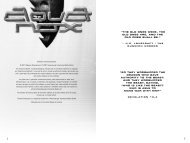Create successful ePaper yourself
Turn your PDF publications into a flip-book with our unique Google optimized e-Paper software.
These talks, on the opposing side, may be sincere or bluff. If they are a<br />
bluff, the nation having entered the talks may lose big in terms of national<br />
will (NW) if the negotiations blow up. On the other hand, if the talks are<br />
sincere, the nation may end at peace with a rather correct outcome.<br />
17.9 Special Cases<br />
Here is the description of the main ‘special’ diplomatic tendencies of the<br />
various countries. The Diplomacy Appendices gives more details on these<br />
tendencies, country by country.<br />
Balkans Rivalries<br />
The Balkan countries (Bulgaria, Romania, Greece, Serbia), Turkey and<br />
Italy are jealous of each other and they hate the others intensely. When a<br />
country joins one side, the other countries more or less react toward the<br />
other side.<br />
Besides that, the Balkan countries still at peace (Bulgaria, Romania and<br />
Greece) are cautious, and therefore the AMBassadors are less efficient in<br />
1914. When a Diplomatic action takes place there in this year, only the -2<br />
to +2 columns of the Diplomatic Table are used, even if the AMBassador<br />
differential is more than that (including the pro-xxx bonuses).<br />
Serbia<br />
Diplomacy is allowed with Serbia in August 1914 only. Afterwards, this is no<br />
longer possible.<br />
Depending on the result, Serbia may achieve a complete or partial<br />
mobilization, or she may even accept the Austro-Hungarian ultimatum.<br />
In any event, the Great War erupts, and cannot be avoided. No matter<br />
what, Russia declares war on Austria-Hungary.<br />
Bulgaria<br />
Bulgaria is pro-Centrals Powers because she wants revenge from her 1913<br />
defeat, when she was crushed by a coalition consisting of all her<br />
neighbors.<br />
The Entente is therefore at a disadvantage, unless it recognizes Bulgaria’s<br />
claims, which will certainly offend the other Balkan countries (especially<br />
Greece). See Promises and Political Action.<br />
Greece<br />
Greece hesitates between the opinion and rule of her King Constantine<br />
(pro-Central Powers) and her Prime Minister Venizelos (pro-Entente).<br />
The nation’s attitude is unreliable and erratic, and swings from one side to<br />
the other randomly. On an even test result she is pro-Entente, on an odd<br />
pro-Central Powers.<br />
This is checked every time a Diplomatic Check applies to Greece (when a<br />
Diplomatic Action is resolved).<br />
92 World War One: La Grande Guerre 1914-1918<br />
There are also two special rules about Greece (See Diplomacy<br />
Appendices):<br />
● The Entente may attempt a putsch in Athens;<br />
● The Entente may land troops in Salonica (according to the 1829<br />
treaty).<br />
Romania<br />
Romania is bound by a treaty to Austria-Hungary. But because of internal<br />
dissensions in August 1914, this treaty may be broken or kept. A secret test<br />
is made during the August 1914 special Diplomacy Phase just before<br />
Romania’s reaction check. The result is a random result, but biased toward<br />
the Entente. It ranges from 0 to +7.<br />
Ottoman Empire (i.e. Turkey)<br />
Turkey’s attitude is pro-Centrals, but it may be influenced by some key<br />
decisions in August 1914, such as:<br />
Great Britain has the option to provide modern battleships, already bought<br />
by Turkey.<br />
Germany may bribe Turkey (Gold of the Kaiser event), and even send her<br />
the powerful BC Goeben (1 battlecruiser).<br />
As long as it is at peace, Turkey gives a AMB 1 to the Central Powers if it<br />
currently is “pro-Centrals Powers” (level 3 or more). The Turk AMBassador<br />
is freely played by the Central Powers (including deploying this<br />
AMBassador in Turkey).<br />
The United States<br />
The United States uses a special rule. ? At the start of the war, the level is<br />
23. Their attitude is Isolationist until level 13, and they declare war on the<br />
Central Powers at level -5. See USA in the Appendices for further details.<br />
Italy<br />
Italy, despite being an official member of the Central Powers, has distanced<br />
itself from the Triple Alliance, and intends to offer its services to the<br />
“highest bidder”.<br />
● Italy is divided and unreliable, and its current attitude is randomly<br />
determined: even pro-Entente, odd pro-Central Powers. BUT, if her<br />
Diplomatic Level is 0 and if the Entente has at least the same number<br />
of AMB as the Centrals Powers, then Italy is always pro-Entente (no<br />
die roll in this case).<br />
● It is checked each time a Diplomatic Action is executed in Italy.<br />
● In addition, Italy makes voracious demands, and this limits<br />
the AMBassador’s efficiency in 1914: as in the Balkans, the<br />
Diplomatic table uses only the -2 to +2 columns, even if the<br />
AMBassador differential is more than that (including the pro-xxx<br />
bonuses).
















